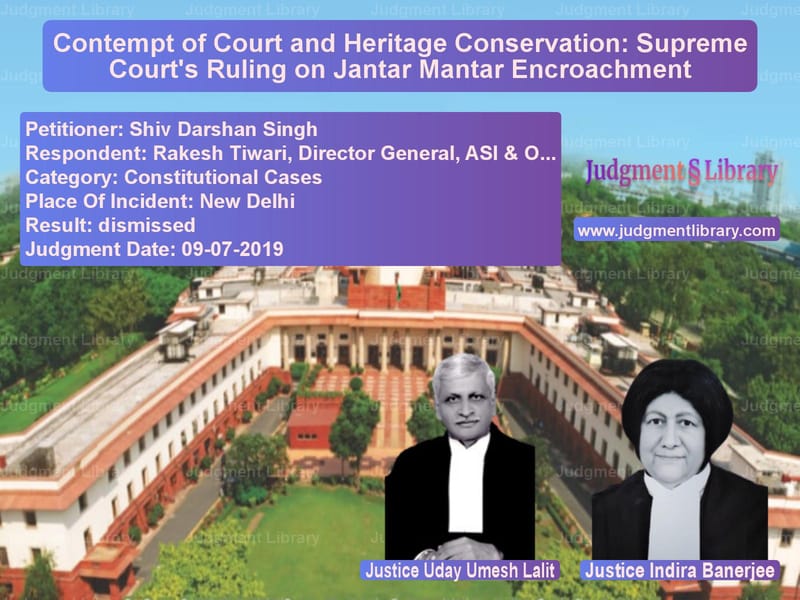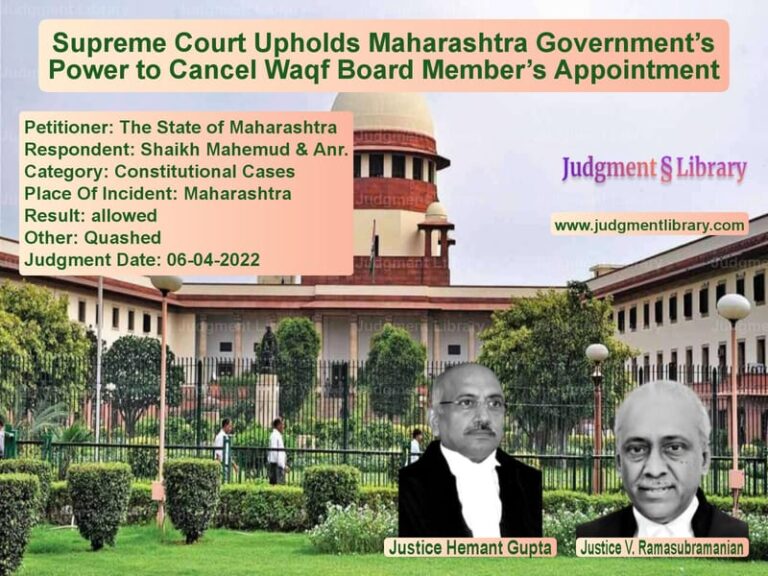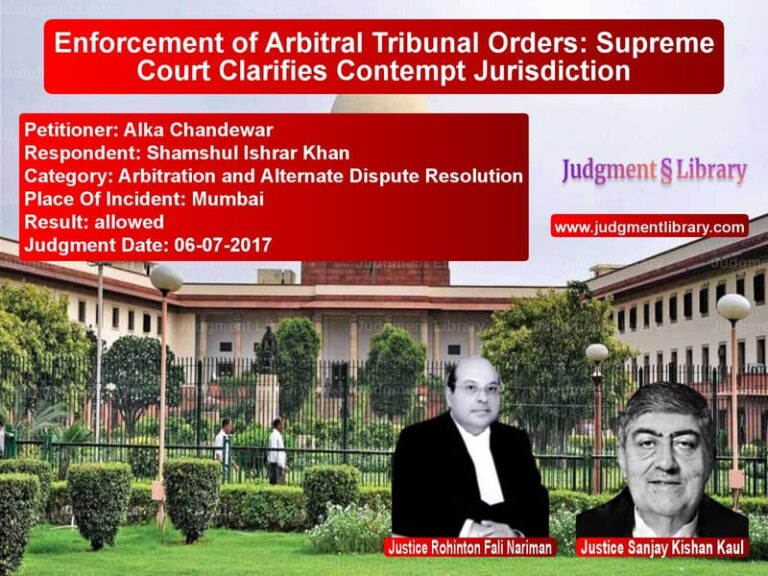Contempt of Court and Heritage Conservation: Supreme Court’s Ruling on Jantar Mantar Encroachment
The Supreme Court of India delivered a significant judgment in the case of Shiv Darshan Singh v. Rakesh Tiwari, Director General, Archaeological Survey of India (ASI) & Ors., concerning the alleged violation of an earlier judgment regarding construction near the Jantar Mantar monument in New Delhi. This case revolved around contempt proceedings initiated against government officials and private parties for failing to comply with court orders that sought to protect an ancient heritage site from illegal construction.
Background of the Case
The dispute began when the petitioner, Shiv Darshan Singh, filed a contempt petition seeking action against the respondents for violating the Supreme Court’s 2012 ruling in Civil Appeal No. 2431 of 2006. The issue pertained to unauthorized construction on a plot adjacent to Jantar Mantar, a protected monument under the Ancient Monuments and Archaeological Sites and Remains Act, 1958 (AMASR Act). The petitioner alleged that despite clear prohibitions on construction in protected and regulated areas, structures were illegally raised.
Key Issues Before the Supreme Court
- Whether the respondents violated the Supreme Court’s 2012 judgment by permitting construction in a prohibited area near Jantar Mantar.
- Whether the permissions granted for renovation and repairs were lawful or amounted to new construction.
- Whether contempt proceedings should be initiated against officials of ASI, the National Monuments Authority (NMA), and private developers.
- Whether the structure in question should be demolished.
Arguments by the Petitioner
The petitioner contended that:
- The Supreme Court had earlier ruled that construction within 100 meters of Jantar Mantar was prohibited, and even repairs required special permission.
- Despite this ruling, unauthorized construction took place, violating the AMASR Act and the court’s directives.
- The ASI and NMA granted permissions for renovation and repair without due process, effectively allowing new construction.
- The court must enforce its earlier orders by directing demolition of the illegal structure and holding the respondents accountable for contempt.
Arguments by the Respondents
The respondents, including ASI officials and private developers, argued that:
- The permissions granted were for renovation and repair, not new construction.
- The building’s structure existed before the Supreme Court’s 2012 ruling, and no additional construction was undertaken.
- The NDMC’s inspections confirmed that no height or area extensions occurred beyond what was already present.
- All approvals followed due process under Sections 20A and 20C of the AMASR Act.
Supreme Court’s Judgment
The Supreme Court, in a judgment authored by Justice Uday Umesh Lalit and Justice Indira Banerjee, held that while there were lapses in how permissions were granted, there was insufficient evidence to hold the respondents in contempt.
On the Issue of Contempt
The Court ruled:
“The evidence does not conclusively establish that the respondents acted in direct defiance of the 2012 judgment. While certain lapses occurred in granting permissions, they do not amount to willful disobedience warranting contempt action.”
On the Issue of Construction
The Court observed:
“The existing structure, as per the records from 2003 and subsequent inspections, has not undergone vertical or horizontal expansion. However, renovations carried out were beyond permissible limits.”
On the Issue of Demolition
The Court declined to order immediate demolition, stating:
“Since the matter is pending before the Delhi High Court, it would be inappropriate for this Court to issue demolition orders at this stage. The High Court must decide based on the facts and applicable laws.”
Key Takeaways from the Judgment
- Contempt proceedings require clear evidence of willful disobedience: Mere procedural lapses do not amount to contempt.
- Renovation cannot be a pretext for unauthorized construction: Any modifications in a protected area must strictly comply with the AMASR Act.
- Judicial Review is Essential in Heritage Protection: Courts play a crucial role in ensuring that heritage laws are followed, preventing encroachment.
- Pending Matters Before the High Court: The Supreme Court refrained from intervening in ongoing litigation, leaving demolition decisions to the High Court.
Conclusion
The Supreme Court’s ruling in this case highlights the complexities of balancing urban development with heritage conservation. While the respondents were not found guilty of contempt, the judgment reinforces the need for strict adherence to heritage protection laws. The case serves as a crucial precedent for future disputes involving protected monuments and unauthorized construction.
Petitioner Name: Shiv Darshan Singh.Respondent Name: Rakesh Tiwari, Director General, ASI & Ors..Judgment By: Justice Uday Umesh Lalit, Justice Indira Banerjee.Place Of Incident: New Delhi.Judgment Date: 09-07-2019.
Don’t miss out on the full details! Download the complete judgment in PDF format below and gain valuable insights instantly!
Download Judgment: Shiv Darshan Singh vs Rakesh Tiwari, Direc Supreme Court of India Judgment Dated 09-07-2019.pdf
Direct Downlaod Judgment: Direct downlaod this Judgment
See all petitions in Public Interest Litigation
See all petitions in Fundamental Rights
See all petitions in Legislative Powers
See all petitions in Separation of Powers
See all petitions in Judgment by Uday Umesh Lalit
See all petitions in Judgment by Indira Banerjee
See all petitions in dismissed
See all petitions in supreme court of India judgments July 2019
See all petitions in 2019 judgments
See all posts in Constitutional Cases Category
See all allowed petitions in Constitutional Cases Category
See all Dismissed petitions in Constitutional Cases Category
See all partially allowed petitions in Constitutional Cases Category







